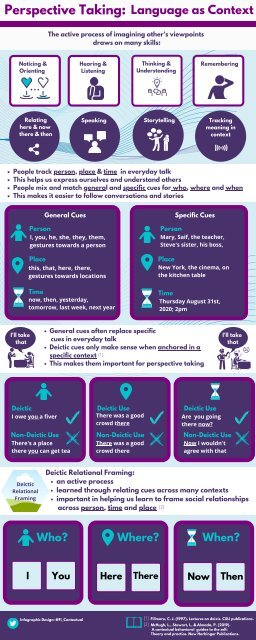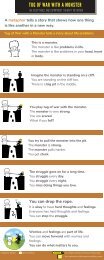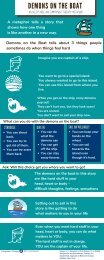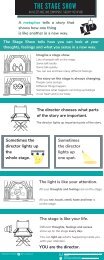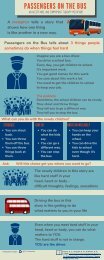Perspective Taking: Language as Context
A brief introduction to Deictic Relational Framing, a theory from the field of Contextual Behavioural Science complemented by information from conceptual understanding of deixis from the field of linguistics.
A brief introduction to Deictic Relational Framing, a theory from the field of Contextual Behavioural Science complemented by information from conceptual understanding of deixis from the field of linguistics.
- No tags were found...
Create successful ePaper yourself
Turn your PDF publications into a flip-book with our unique Google optimized e-Paper software.
<strong>Perspective</strong> <strong>Taking</strong>:<br />
<strong>Language</strong> <strong>as</strong> <strong>Context</strong><br />
The active process of imagining other's viewpoints<br />
draws on many skills:<br />
Noticing &<br />
Orienting<br />
Hearing &<br />
Listening<br />
Thinking &<br />
Understanding<br />
Remembering<br />
Relating<br />
here & now<br />
there & then<br />
Speaking<br />
Storytelling<br />
Tracking<br />
meaning in<br />
context<br />
People track person, place & time in everyday talk<br />
This helps us express ourselves and understand others<br />
People mix and match general and specific cues for who, where and when<br />
This makes it e<strong>as</strong>ier to follow conversations and stories<br />
Person<br />
I, you, he, she, they, them,<br />
gestures towards a person<br />
Place<br />
General Cues<br />
this, that, here, there,<br />
gestures towards locations<br />
Time<br />
now, then, yesterday,<br />
tomorrow, l<strong>as</strong>t week, next year<br />
Specific Cues<br />
Person<br />
Mary, Saif, the teacher,<br />
Steve's sister, his boss,<br />
Place<br />
New York, the cinema, on<br />
the kitchen table<br />
Time<br />
Thursday August 31st,<br />
2020; 2pm<br />
I'll take<br />
that<br />
General cues often replace specific<br />
cues in everyday talk<br />
Deictic cues only make sense when anchored in a<br />
specific context [1]<br />
This makes them important for perspective taking<br />
[1]<br />
I'll take<br />
that<br />
Deictic<br />
I owe you a fiver<br />
Non-Deictic Use<br />
There's a place<br />
there you can get tea<br />
Deictic Use<br />
There w<strong>as</strong> a good<br />
crowd there<br />
Non-Deictic Use<br />
There w<strong>as</strong> a good<br />
crowd there<br />
Deictic Use<br />
Are you going<br />
there now?<br />
Non-Deictic Use<br />
Now I wouldn't<br />
agree with that<br />
Deictic<br />
Relational<br />
Framing<br />
Deictic Relational Framing:<br />
an active process<br />
learned through relating cues across many contexts<br />
important in helping us learn to frame social relationships<br />
across person, time and place [2]<br />
Who? Where? When?<br />
I You Here There Now Then<br />
Infographic Design: @Fi_<strong>Context</strong>ual<br />
[1]<br />
[2]<br />
Fillmore, C. J. (1997). Lectures on deixis. CSLI publications.<br />
McHugh, L., Stewart, I., & Almada, P. (2019).<br />
A contextual behavioral guidee to the self:<br />
Theory and practice. New Harbinger Publications.


